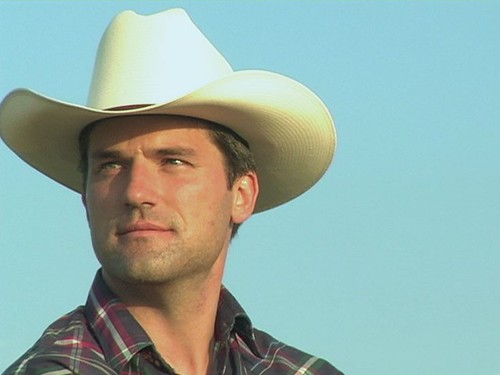interview
-
U.S. Senate candidate Scott Kleeb and the clean energy roundup
Fresh from an overwhelming primary victory in Nebraska's U.S. Senate race, 32-year-old rancher, Yale Ph.D., and college history teacher Scott Kleeb spoke with me on the phone about his "brand of change" for a clean energy economy and the environment.

Kleeb shocked the political establishment in 2006 by getting 45 percent of the vote in Nebraska's 3rd Congressional District, one of the most Republican districts in the country. Then, as now, he ran as a clear progressive on most economic and environmental issues (while staying coy on some contentious social issues).
One of Kleeb's core concerns has been meeting the challenge of the climate crisis through a clean energy revolution on the prairie and through aggressive use of domestic and international forest and farm carbon credits. Through it all, Kleeb has been aided by a huge renewable resource of his own: megawatt good looks that won him "The Hot Rancher" award from Young Voter PAC.
Now Kleeb is hoping his unique combination of deep Nebraska roots, Ivy League cred, and movie star charm will help him overcome his opponent: President Bush's former agriculture secretary (and former Nebraska governor) Mike Johanns, who's based his career on support for Big Ag, free trade, and fossil fuels.
Q. Where do you see Nebraska's economic future, and what role do you think clean energy will play in it?
A. We've got to transform the way we produce and consume energy. There's a failure of leadership we've seen at all levels of government. We've got to figure out how to do more with less. That's true of our elected officials and true of ourselves as individuals. This is a generations-long process. We are on the cusp of it right now. Biofuels and wind energy and solar energy and algae-based energy is just the tip of the iceberg.
Nebraska's economy is going to be transformed by that revolution. Farmers will find new ways of feeding or, once we get to cellulosic ethanol, fueling the world.
Q. Recent studies have suggested that devoting American land to growing biofuels instead of food is causing massive deforestation in carbon-rich tropical forests. How can switchgrass and cellulosic ethanol be viable if it's just causing food to be grown in these highly sensitive ecosystems thousands of miles away?
-
Q&A with Van Jones about the Climate Security Act and green jobs
Van Jones. What does the green jobs and justice community think about the Lieberman-Warner Climate Security Act? To get one perspective, Grist caught up with Van Jones, the founder of Green For All, a group that promotes green-jobs policies and environmental justice. Jones, a civil-rights lawyer and the founder and former executive director of the […]
-
What should I ask the efficiency guru about nuclear power?
Amory Lovins. Photo: © Judy Hill Amory Lovins is on the warpath against nuclear power, battling the industry PR push that says nuclear is a viable climate solution. He’s got a new report, co-authored with Imran Sheikh, called “The Nuclear Illusion” [PDF]. Spinning off from that report are a Newsweek article called “Missing the Market […]
-
Interview with solar champion Hermann Scheer
NewScientist has a great interview with German Social Democrat MP Hermann Scheer, who chairs the World Council for Renewable Energy and has done as much as anyone alive to spread the word on solar power. Unfortunately, it’s behind a subscription wall, so you can’t read it. But have no fear! I’ll post a big chunk […]
-
Jason Mraz sings the praises of a simpler life
Jason Mraz is strumming up support for sustainability. Jason Mraz may still be the geek in the pink, but these days, the pop-rock-rhymer is hoping to distance himself from his cigarette-puffin’, girl-chasin’ past and move toward a simpler, more sustainable life. Since returning from his Mr. A-Z tour two years ago, Mraz has focused his […]
-
Grist talks to underdog Oregon Senate contender Steve Novick
Tomorrow is the presidential primary in both Oregon and Kentucky, but it’s also a key Senate primary in Oregon, where two Democrats are facing off to see who will get to take a crack at unseating Gordon Smith, the sole GOP senator on the West Coast. When Oregon House Speaker Jeff Merkley announced his bid […]
-
Obama energy adviser Jason Grumet talks climate, coal, and transportation policy
As executive director of the National Commission on Energy Policy, a bipartisan group of 20 energy experts created in 2002, Jason Grumet has come in for some flack from environmentalists. NCEP’s influential 2004 energy report called for several measures anathema to greens, including a "safety valve" that would set an upper limit on the price […]
-
An interview with Vinod Khosla
Adam Lashinsky interviews Vinod Khosla. I liveblog. VK’s four major investment areas: oil, coal, efficiency, and materials. AL: India finance minister called biofuels a crime against humanity. What up? VK: Food-based ethanol isn’t the big driver of food prices. Regardless, biofuels don’t have to be food-based. AL: But you’ve invested in food-based ethanol. VK: Only […]
-
A conversation with McCain policy adviser Douglas Holtz-Eakin
Opinions differ on the quality of John McCain’s domestic policy agenda, but you’d have trouble finding anyone in Washington who would disparage the man he’s chosen as one of his top advisers. Douglas Holtz-Eakin has a dauntingly long resume and a reputation among policy wonks on both sides of the aisle for fair-minded number crunching. […]